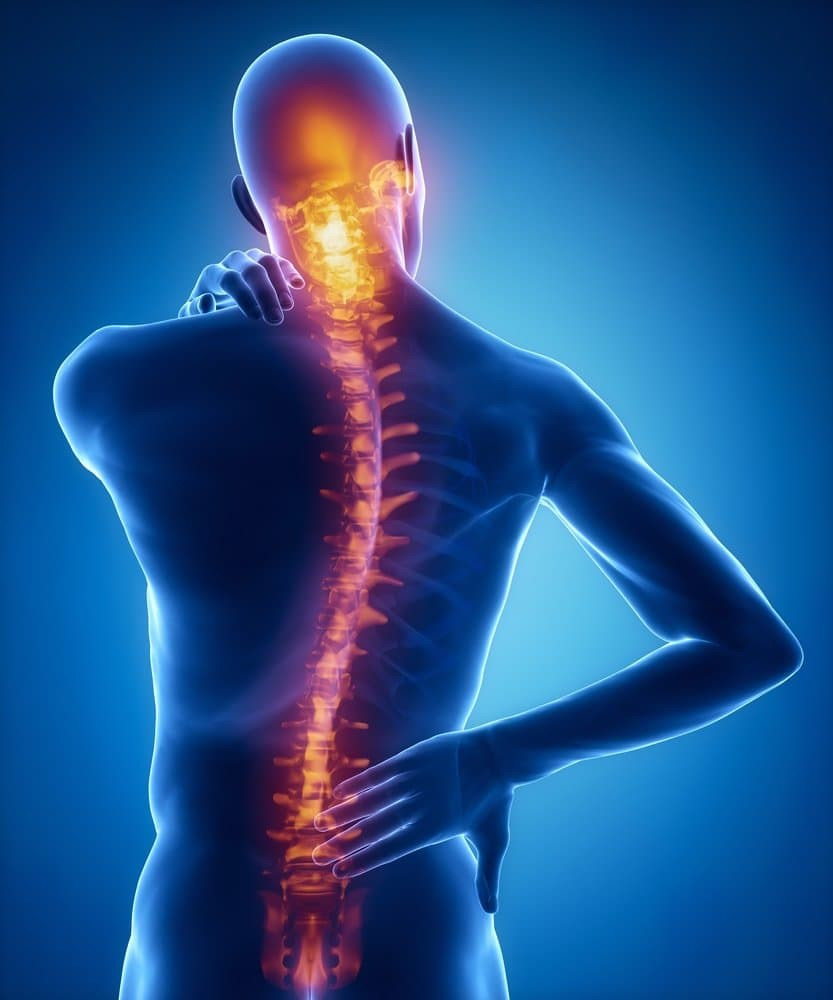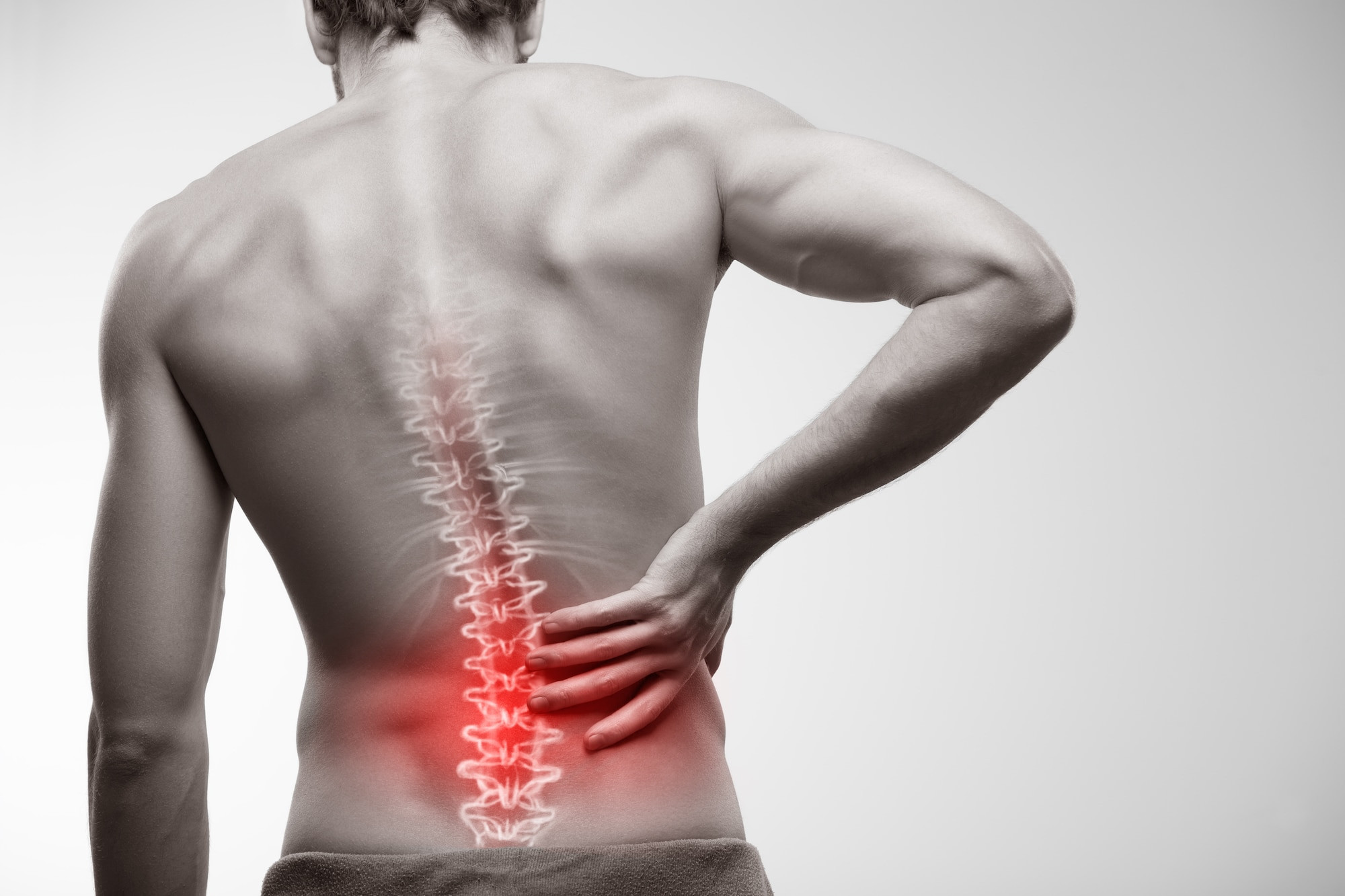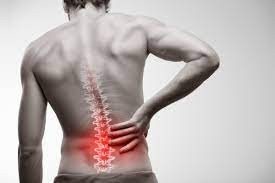Definisi
Penyakit Hernia Nukleus Pulposus (HNP) adalah penyakit yang terjadi ketika diskus atau piringan sendi yang merupakan bantalan ruas tulang belakang mengalami pergeseran dari posisi semula dan menekan saraf tulang belakang. HNP juga dikenal dengan istilah “saraf terjepit”. Saraf yang terjepit ini akan menghasilkan gejala tergantung lokasinya, lokasi yang paling sering terjadi yaitu di punggung bawah (lumbal) atau di leher. Kejadian HNP di punggung bawah lebih sering terjadi dibandingkan di leher.
Penyebab
HNP disebabkan oleh melemahnya jaringan di bantalan tulang belakang. Seiring dengan bertambahnya usia, kelenturan bantalan tulang belakang akan berkurang sehingga rentan terhadap cedera. HNP juga dapat terjadi paska terjatuh atau mengalami benturan pada tulang belakng. Selain itu beberapa penyebab lain dari HNP seperti memiliki berat badan berlebih, mengangkat beban berat dengan posisi dan tumpuan yang salah, melakukan gerakan menunduk, dan berputar secara mendadak atau berulang.
Faktor Risiko
Faktor risiko yang menyebabkan orang rentan menderita HNP meliputi:
- Orang yang pekerjaannya mengangkat barang berat
- Olahraga berat
- Melakukan kegiatan berulang dan berlangsung lama seperti membungkuk atau memutar secara berlebihan
- Merokok
- Kelebihan berat badan, karena akan memberikan tekanan pada punggung bawah
- Bertambahnya usia. Usia yang semakin tua juga berisiko tinggi mengalami HNP
- Faktor genetik
Gejala
Gejala HNP berbeda-beda tergantung pada lokasinya. HNP biasa terjadi pada leher dan punggung bawah.
Bila HNP atau saraf terjepit ini terjadi pada leher, biasanya gejalanya meliputi:
- Kekakuan pada leher
- Nyeri yang menjalar dari leher hingga ke bahu dan lengan
- Nyeri yang dapat diperparah ketika batuk, bersih atau berpindah posisi
- Kesemutan, lemah, atau kaku otot di salah satu lengan
- Sensasi seperti terbakar di leher, bahu, dan lengan
Bila HNP atau saraf terjepit terjadi pada bagian punggung bawah, maka dapat menyebabkan beberapa gejala berikut ini:
- Sakit di punggung bagian bawah yang memburuk ketika bergerak
- Nyeri yang dapat menjalar hingga ke tulang ekor, bokong, paha, betis, dan kaki
- Nyeri seperti di tusuk-tusuk di area bokong yang menjalar ke salah satu tungkai
- Kesemutan atau lemah otot di tungkai
Pada kasus HNP, kelemahan otot dapat semakin mengganggu aktivitas dan menyebabkan menurunnya kemampuan untuk mengangkat atau membawa barang. Walaupun jaran, tetapi pada beberapa kasus, HNP punggung bawah juga dapat menyebabkan penderitanya tidak bisa menahan buang air kecil dan buang air besar.
Diagnosis
Untuk mendiagnosis HNP diperlukan wawancara mendalam (anamnesis) mengenai gejala yang dialami seperti nyeri di leher atau di punggung bawah, apakah nyeri menjalar, disertai rasa terbakar, kesemutan, dan bahkan kelemahan. Apakah terdapat pencetus seperti trauma yang mengakibatkan tulang punggung terbentur, riwayat pekerjaan, dan postur tubuh. Perlu juga diperhatikan untuk menyingkirkan diagnosis penyakit lain yang mendasari, seperti kelemahan anggota tubuh sebagian, mual muntah, demam, serta penurunan kesadaran. Pemeriksaan fisik penting untuk dilakukan pengukuran berat badan penderita karena obesitas merupakan salah satu faktor risiko terjadinya HNP. Selanjutnya anda akan diminta berbaring dan diminta menggerakkan kaki ke berbagai posisi untuk membantu menentukan penyebab rasa sakitnya. Dokter akan mengevaluasi tiap-tiap ruas tulang belakang untuk menentukan lokasi HNP nya. Dokter mungkin juga akan melakukan tes neurologis untuk memeriksa refleks, kekuatan otot, kemampuan berjalan, kemampuan untuk merasakan sentuhan lembut atau getaran. Pada sebagian kasus HNP, pemeriksaan fisik dan riwayat medis yang didapatkan sudah bisa digunakan untuk menegakkan diagnose, namun apabila dokter mencurigai kondisi lain atau perlu melihat saraf mana yang terkena dapat dilakukan tes pencitraan seperti Xray, CT scan, MRI, myelogram serta elektromiogram (EMG) untuk mengukur seberapa baik listrik bergerak di sepanjang jaringan saraf.
Tata Laksana
Pada beberapa kasus HNP, gejala dapat membaik dengan terapi konservatif tanpa perlu dilakukannya tindakan operasi. Pada pasien yang tidak mengalami perbaikan melalui terapi konservatif, perlu dipertimbangkan adanya terapi invasive seperti disuntikan steroid bahkan hingga operasi.
Rasa nyeri pada HNP merupakan gejala umum pada kondisi saraf terjepit. Untuk menghilangkan rasa nyeri tersebut dapat diberikan obat anti-inflamasi non steroid (OAINS) seperti ibuprofen dan naproxen untuk membantu mengatasi peradangan atau rasa nyeri yang ditimbulkan oleh saraf yang terjepit. Obat kortikosteroid juga dapat diberikan untuk mengurangi rasa sakit dan pembengkakan yang terjadi.
Tindakan opeasi dilakukan jika gejala semakin parah hingga mengganggu dan tidak menunjukkan adanya perbaikan. Prosedur operasi HNP disebut microdiscectomy, yaitu cakram yang menonjol atau rusak akan diambil tanpa mengambil keseluruhan cakram, cakram kemudian diganti dengan buatan dan menggabungkan tulang belakang yang disebut laminectomy dan spinal fusion.
Komplikasi
HNP yang tidak segera ditangani dapat menyebabkan nyeri menjadi semakin buruk, bahkan hingga menimbulkan kelemahan, mengganggu aktivitas sehari-hari, menyebabkan pederita tidak bisa menahan kencing dan buang air besar, hilang sensasi, dan apabila terjadi kerusakan saraf permanen dapat menyebabkan kelumpuhan.
Pencegahan
Untuk mengurangi risiko terjadinya HNP dapat dilakukan beberapa aktivitas seperti berolahraga secara teratur seperti berenang, menjaga postur tubuh tetap baik seperti duduk tegak atau mengangkat beban dengan posisi yang benar. Mempertahankan berat badan ideal untuk mencegah tekanan berlebihan pada tulang belakang, berhenti merokok karena kandungan didalam rokok dapat mengurangi suplai oksigen ke bantalan tulang belakang.
Kapan Harus ke Dokter
Anda disarankan untuk segera ke dokter apabila nyeri tidak kunjung hilang dan menjalar hingga ke tungkai atau menyebabkan kesemutan serta lemah otot ditungkai dan mati rasa. Perlu diwaspadai apabila nyeri sampai membuat Anda mengompol, tidak bisa menahan buang air besar, kelumpuhan atau terjadi sehabis mengalami cedera. Perlu diperhatikan apabila ada penurunan kesadaran, mual muntah, demam, kelemahan anggota tubuh sebagian, bicara pelo untuk segera mendapat perawatan di IGD.
Ingin tahu informasi seputar penyakit saraf lainnya? Yuk simak informasinya di sini ya!
- dr Ayu Munawaroh, MKK
American Academy of Orthopaedic Surgeons (2018). Herniated Disk in the Lower Back.
American Academy of Orthopaedic Surgeons (2012). Herniated Disk.
Tidy, C. Patient (2016). Spinal Disc Problems.
WebMD (2019). What is a Herniated Cervical Disk?
Pulposus (HNP) Lumbal. Jurnal Kedokteran Diponegoro, 5(4), 1364-77.












